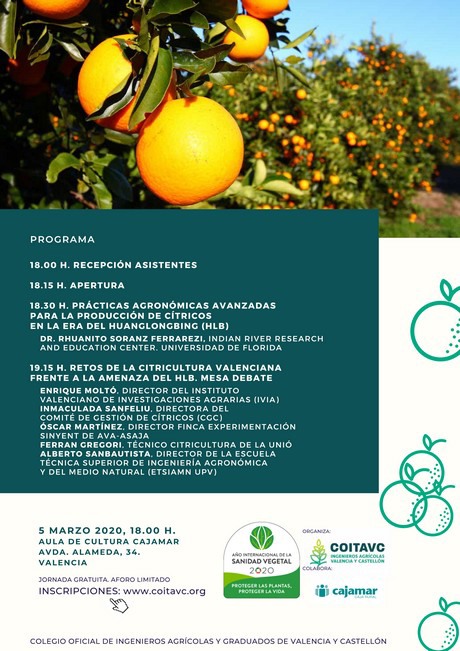The College of Agricultural and Graduate Technical Engineers of Valencia and Castellón (COITAVC) is focusing its efforts on a disease that attacks citrus, the most important crop in the Region of Valencia. We are talking about Huanglongbing, also known as HLB or Greening; a disease caused by bacteria for which there is still no cure, and which is transmitted by the bite of a vector insect, Trioza erytreae, which has already entered the peninsula through Galicia and Portugal and is moving towards citrus growing areas.
Given the real threat posed by the vector, the COITAVC is focusing its efforts on disseminating information on agronomic practices to prevent it. For this reason, the College of Agricultural Engineers of Valencia and Castellón has organized a technical conference on advanced agronomic practices for citrus production in the Huanglongbing (HLB) era. The event will take place on Thursday, at 6 pm, at the Cajamar Cultural Center, in Valencia. It will feature the expert Rhuanito Soranz Ferrarezi, of the Indian River Research and Education Center of the University of Florida, who will talk about the latest techniques that are being developed in the field of citrus farming to fight HLB.
Following this presentation, there will be a debate on the 'Challenges of the Valencian citrus industry when facing the threat of the HLB', with an analysis focused on the peculiarities of the citrus sector in the Mediterranean arch and how these could affect the arrival of the HLB. The participants of the debate will be Enrique Moltó, director of the Valencian Institute of Agricultural Research (IVIA); Inmaculada Sanfeliu, director of the Citrus Management Committee (CGC); Óscar Martínez, director of the Sinyent AVA-Asaja experimental farm; Ferran Gregori, citrus technician at La Unió de Llauradors, and Alberto Sanbautista, director of the Higher Technical School of Agronomic and Natural Environment Engineering of the Polytechnic University of Valencia (ETSIAMN UPV).

"As professionals in Agricultural Engineering, we are concerned with this threat to the citrus sector. We are using our role as technicians to organize conferences like this and get to know how other areas that have been dealing with the HLB for a long time are handling it, and how we could apply that in the Mediterranean,” says Regina Monsalve, president of COITAVC.
 Source: www.coitavc.org
Source: www.coitavc.org
